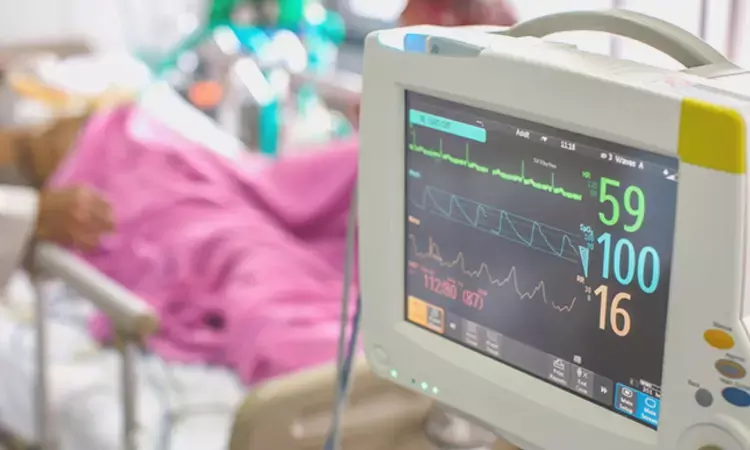- Home
- Medical news & Guidelines
- Anesthesiology
- Cardiology and CTVS
- Critical Care
- Dentistry
- Dermatology
- Diabetes and Endocrinology
- ENT
- Gastroenterology
- Medicine
- Nephrology
- Neurology
- Obstretics-Gynaecology
- Oncology
- Ophthalmology
- Orthopaedics
- Pediatrics-Neonatology
- Psychiatry
- Pulmonology
- Radiology
- Surgery
- Urology
- Laboratory Medicine
- Diet
- Nursing
- Paramedical
- Physiotherapy
- Health news
- Fact Check
- Bone Health Fact Check
- Brain Health Fact Check
- Cancer Related Fact Check
- Child Care Fact Check
- Dental and oral health fact check
- Diabetes and metabolic health fact check
- Diet and Nutrition Fact Check
- Eye and ENT Care Fact Check
- Fitness fact check
- Gut health fact check
- Heart health fact check
- Kidney health fact check
- Medical education fact check
- Men's health fact check
- Respiratory fact check
- Skin and hair care fact check
- Vaccine and Immunization fact check
- Women's health fact check
- AYUSH
- State News
- Andaman and Nicobar Islands
- Andhra Pradesh
- Arunachal Pradesh
- Assam
- Bihar
- Chandigarh
- Chattisgarh
- Dadra and Nagar Haveli
- Daman and Diu
- Delhi
- Goa
- Gujarat
- Haryana
- Himachal Pradesh
- Jammu & Kashmir
- Jharkhand
- Karnataka
- Kerala
- Ladakh
- Lakshadweep
- Madhya Pradesh
- Maharashtra
- Manipur
- Meghalaya
- Mizoram
- Nagaland
- Odisha
- Puducherry
- Punjab
- Rajasthan
- Sikkim
- Tamil Nadu
- Telangana
- Tripura
- Uttar Pradesh
- Uttrakhand
- West Bengal
- Medical Education
- Industry
Higher protein dosing fails to improve clinical outcomes in ICU patients: EFFORT Protein trial

USA: Higher protein dosing in mechanically ventilated critically ill patients failed to improve the time-to-discharge-alive from the hospital and worsened outcomes for patients with AKI (acute kidney injury), and high organ failure scores, findings from the EFFORT Protein trial have shown. The results were published in The Lancet on February 18, 2023
International critical care nutrition guidelines recommend various protein doses based on low-quality evidence. The effect of administering high-dose protein during critical illness is not known. Therefore, Prof Daren K Heyland, Clinical Evaluation Research Unit, Queen's University, Kingston, ON, Canada, and colleagues aimed to test the hypothesis that a higher protein dose provided to ICU patients would improve their clinical outcomes in an international, single-blinded, pragmatic, investigator-initiated, registry-based, randomised trial.
The trial was undertaken in 85 ICUs (intensive care units) across 16 countries. The research team enrolled nutritionally high-risk adults undergoing mechanical ventilation to draw a comparison between a high-dose protein of ≥2·2 g/kg per day and a usual dose protein of ≤1·2 g/kg per day initiated within 96 h of admission in ICU and continued for up to death or 28 days or transition to oral feeding.
Time-to-discharge-alive from the hospital up to 60 days after ICU admission (primary efficacy outcome) was determined. Participants were randomly allocated in a ratio of 1:1 to high-dose protein or usual-dose protein. Patients were not made informed of the treatment allocation. The secondary outcome was 60-day morality. Regardless of study compliance, patients were evaluated in the group to which they were randomly assigned. However, patients who dropped out of the study before getting the study intervention were excluded.
The authors reported the following findings:
· 1329 patients were randomised, and 97·9% were included in the analysis ( 656 in the usual dose group and 645 in the high-dose protein group).
· In the high-dose group, the cumulative incidence of alive hospital discharge was 46·1% by 60 days after randomisation compared with 50·2% in the group with usual dose protein (hazard ratio 0·91).
· The 60-day mortality rate was 34·6% in the high-dose protein group compared with 32·1% in the usual dose protein group (relative risk 1·08).
· The researchers observed a subgroup effect, with higher protein provision specifically harmful in patients with higher organ failure scores and acute kidney injury.
In both high- and regular-protein groups, time-to-discharge-alive from the hospital was similar. And the researchers did not observe any significant inter-group difference in the 60-day mortality rate, but the higher dose protein group was more harmful in patients with acute kidney injury.
Reference:
Heyland DK, Patel J, Compher C, Rice TW, Bear DE, Lee ZY, González VC, O'Reilly K, Regala R, Wedemire C, Ibarra-Estrada M, Stoppe C, Ortiz-Reyes L, Jiang X, Day AG; EFFORT Protein Trial team. The effect of higher protein dosing in critically ill patients with high nutritional risk (EFFORT Protein): an international, multicentre, pragmatic, registry-based randomised trial. Lancet. 2023 Feb 18;401(10376):568-576. doi: 10.1016/S0140-6736(22)02469-2. Epub 2023 January 25. PMID: 36708732.
Dr Kamal Kant Kohli-MBBS, DTCD- a chest specialist with more than 30 years of practice and a flair for writing clinical articles, Dr Kamal Kant Kohli joined Medical Dialogues as a Chief Editor of Medical News. Besides writing articles, as an editor, he proofreads and verifies all the medical content published on Medical Dialogues including those coming from journals, studies,medical conferences,guidelines etc. Email: drkohli@medicaldialogues.in. Contact no. 011-43720751


